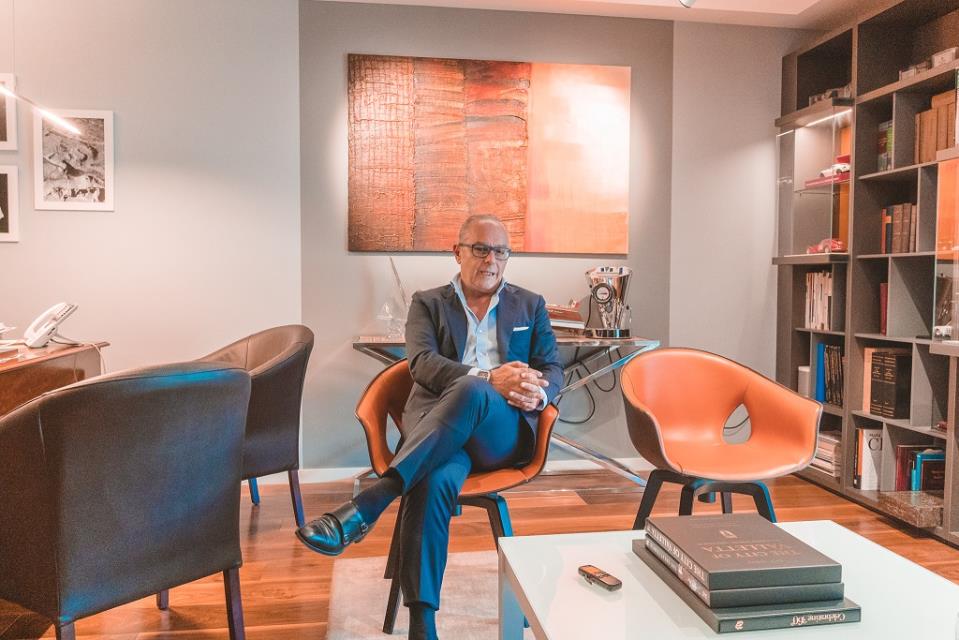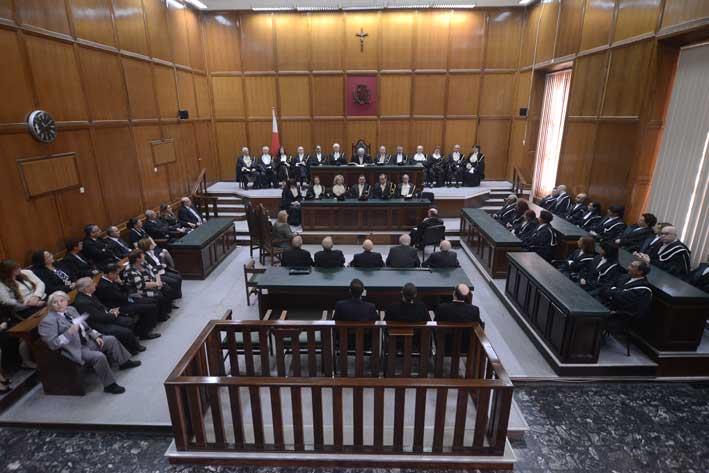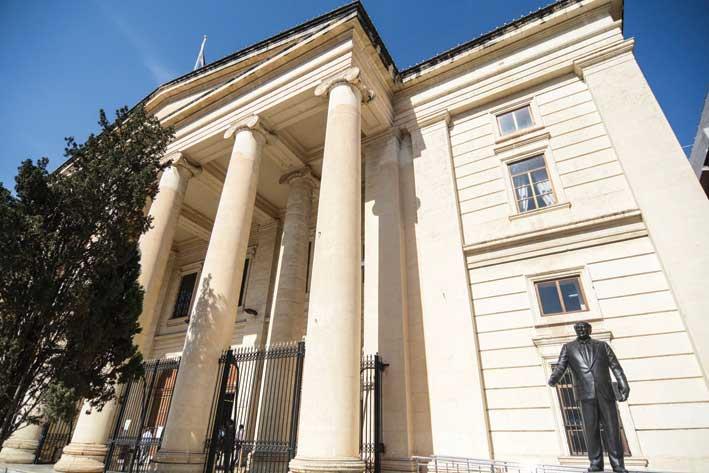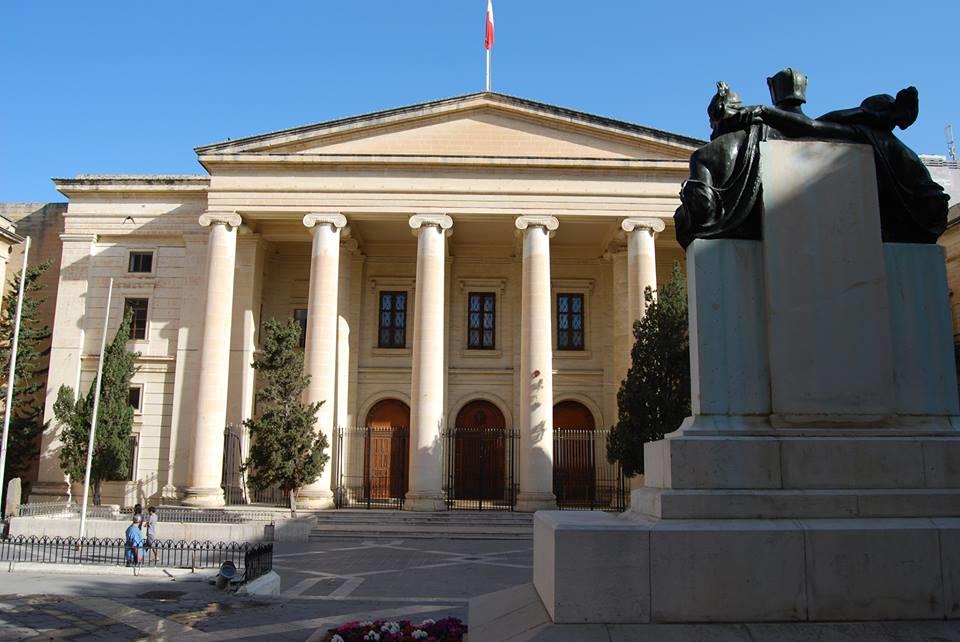Delays in court are nothing like what they used to be in the past, the President of the Chamber of Advocates told The Malta Independent, but stressed that there is still a long way to go to solve the issue.
The Chamber’s President, Dr Louis de Gabriele, told The Malta Independent during an interview that reducing court delays is not something that can be achieved in a single brush stroke, but will require a lot of small changes to take place.
He has a number of ideas as to how court delays can be reduced, but stressed that certain kinds of cases should take priority, such as domestic violence cases. He explained that domestic violence cases take a toll on the victims and so delays and the lengthy proceedings could be harmful, but in order to deal with this particular issue, more members of the judiciary would need to be appointed, he said.
But recruiting, to the judiciary, is not the only way delays in the courts as a whole can be reduced, he said, adding that there are other ways through which they could be tackled, some of which require major changes to the way the courts operate today.
One proposal made by the Chamber President revolves around the Court of Appeals and the removal of obligatory oral hearings in such cases.
“We discussed ideas to reduce the time appeal cases take with the government. I know that something will be done about this issue as I have already seen and commented on a proposal by the government that would see appeals no longer include a mandatory oral hearing. What happens today, is that when someone wants to appeal from a First Hall of the Civil Court decision, they first file the appeal application. The other party then may, or may not, reply. The parties then wait between four and five years to be called to court to make sure that all the administrative issues relative to that appeal have been observed. After that, a date is given as to when the appeal will be heard.”

“So the parties would have waited over four years just to make sure that all the administrative issues have been handled, and then the hearing is held. In the vast majority of the cases, most of what is debated in the oral hearing will not differ from what was penned in the written submissions. We have discussed this situation with a Council and Europe commission and in most other EU countries, all appeals are simply handled through written pleadings.”
He explained that there is legislation being drafted that will amend the Code of Organisation to ensure that appeals will simply be dealt with through written pleadings. The changes, he said, would extend the time a party will have to file an appeal on a court case that had been decided, and make the other party’s reply to the appeal mandatory rather than optional, while having a certain amount of time to respond. Within six month of said response, the Court of Appeal would then decide on the case, without ever calling an oral hearing unless the Court itself wishes to do so to clarify any matters. This, he said, should reduce the time it takes appeal cases to be decided.
There are other ways the Chamber believes court delays could be reduced.
“We took the opportunity last May, due to the COVID-19 pandemic, to issue a paper on the zero-risk reopening of the courts by holding virtual sittings and making better use of technology. As part of that paper we also made another suggestion that, regardless of the use of technology, it is high time that we revisit the working practices in court.”
De Gabriele stressed that he is not referring to the laws of procedure, but about working practices in court which had been established over the years and are, today, “obsolete.”
One example of such practices are case management sittings. In such sittings, the parties might only need to tell the court that they tried to settle and did not agree for instance, he said. “These cases waste the time of the judiciary, as the case would need to be inserted on the case list, in addition to the lawyers having to be present and possibly their clients.”
“Case management sittings need not be heard by a judge or magistrate. Instead, we should have administrative staff – like the Deputy Registrar of the hall – take care of case management sittings, thus allowing the judiciary to really focus on the issues that matter, like hearing party's make submissions or hearing witness testimony.”

COVID-19 court procedure that should be kept
The COVID-19 experience has also brought with it some alterations to court procedure which the Chamber President believes should be kept.
“A judge should not appoint a large number of cases all set for 9am.What we have established so far, as part of the COVID protocols, is that judges will create 10 minute slots for a case. They will know what a case sitting will entail and can estimate how much time they need to deal with a case. If a case is an hour long, six slots are allocated for it.”
He explained that removing case management hearings from being heard by the judiciary would work hand in hand with this measure, resulting in judges having fewer cases on their list, being able to accurately define the times of a sitting, thus meaning less time for people wasted waiting in court.
This is doable in civil cases and in the superior courts, but might have implementation issues in the district courts, he said. To tackle the case loads in the district courts, he suggests decriminalising some issues dealt with in such courts, and creating Justices of the Peace to deal with them, similar to how parking violations are dealt by a tribunal.

Judges have retired and not been replaced
The government had, in recent years, tried to recruit more judges and magistrates to try and tackle delays. He was asked: “The Chief Justice recently highlighted a particular issue, that while many lawyers graduate each year, only a few end up practising in court and this could lead to a numbers issue down the line, where there will be a smaller pool of lawyers to choose from when it comes to appointing members of the judiciary. Do you share this concern?”
De Gabriele said that he is of two minds about this issue.
“In principle he is correct. First of all, we need more judges and magistrates. If you look at the number of judges per capita, Malta is well below the EU average.”
He said that judges have retired and thus far have not been replaced, highlighting the court case challenging the appointment of recent members of the judiciary as a possible reason for the government’s reluctance to move ahead, until it concludes.
He said, however, that he isn’t sure if there is a need for more lawyers working in the courts themselves.
“It helps to have extensive experience in court, but on the other hand being a transactional lawyer also helps. The Judiciary should include lawyers who have had different experiences. They need a certain number of years as a practicing lawyer, yes, but a practicing lawyer in the 21st century does not necessarily mean that one would spend most of their day in court.”
“The Chief Justice also spoke about possibly needing to look again at the University’s law course in this respect. I agree, but potentially for different reasons. The University of Malta is an academic institution, it does not make people lawyers but rather is a prerequisite for someone to become a lawyer. It is only after one passes their warrant exam and takes the Oath of Office that one becomes a lawyer. If we are going to keep relying on the University of Malta to academically prepare the lawyers and judges of tomorrow, then I think that the judiciary, the Chamber of Advocates and the university should sit down to determine and design a programme that is fit for purpose and not outdated.”
He explained that the Chamber runs the Malta Law Academy and is trying to design a programme to prepare lawyers for their warrant exam. “We are trying to get university students to understand what it means to become a lawyer, and not just have a law degree.”
He believes that this could help bridge the gap between people completing university and becoming a lawyer.

Court judgements and data protection
The conversation then turned to court judgements and data protection. In court judgements, information about certain parties is listed, such as their ID card number and their address. There has been some concern that such information could lead to those wishing to harm individuals finding out such details.
Asked about this, he stressed that a court judgement is a public document. “Court sittings are public sittings, so that document is not the only source where one can get that information. If a member of the public wants to go to court, sit down and listen they can. Maybe not right now due to COVID-19 restrictions, but under normal circumstances they can. It is a fundamental human right under Articles 5 and 6 of the European Convention on Human Rights that hearings need to be heard in public. That is part of the checks and balances that exist within the State. In a public hearing, anyone can go into a courtroom, whether it is a criminal or civil case, and get all of that information.”
“In my view, anyone who wants to harm somebody and has the intention to do so will find a way of obtaining that information and would not need to search the court database to do it.”
On the other end of the spectrum there is the whole right to be forgotten issue when it comes to court judgements being outright removed. He was asked whether the Chamber believes this should change.
He said that having court judgements available, even for jurisprudence sake, is important.
“Now, if at all, maybe a person can have their name redacted if there is an issue with their right to be forgotten.”
Family court judges face far more emotionally taxing cases
On the issue of the family courts, de Gabriele said that he has spoken with a number of judges who agree that a rotation system is needed, stressing that family court judges go through a far more emotionally taxing cases than others.
“Judges are human like the rest of us, like the people who appear before them. They have their own imperfections like we all do and if anyone believes that the judge is not aware or does not know that he or she needs to make a decision, they are wrong. But there are certain legal impediments which stop such judges from being able to do as they wish to bring a situation to a close. Judges have emotions and would know that resources might be lacking, or that the law might not allow them to do certain things. I think we really need to look at this by, firstly, giving more resources to the family court.”
Lawyer’s Act
He was also asked about the Lawyer’s Act, and for any updates in that regard. He expressed his belief that such an Act is fundamental in the development and evolution of the profession going forward.
He had hoped that this would have been brought before Parliament after the summer recess, however it was not so.
“What is apparent is that, through my recent discussions with the minister, for the first time the government has come back with a mark-up on our proposal and has given some of its own input. We have responded and so there has been a compromise shift in the positioning. I have meetings planned with the minister over the coming weeks and I hope that we will achieve further progress.”